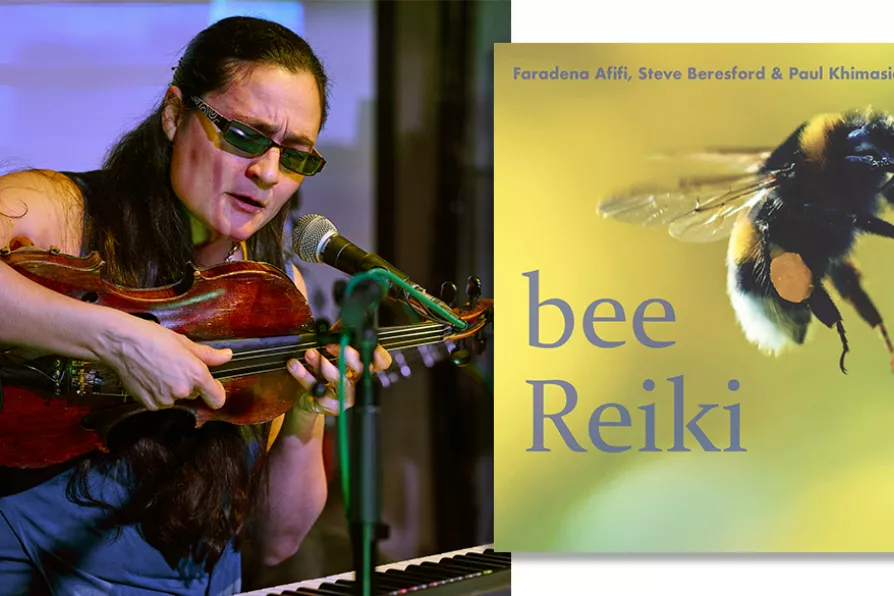JAN WOOLF finds out where she came from and where she’s going amid Pete Townsend’s tribute to 1970s youth culture

 Faradena Afifi
Faradena Afifi
AS SHE was about to to enter an east London studio in November 2022 to create the album which eventually became bee Reiki, violinist and vocalist Faradena Afifi had an unusual meeting.
“A white-tailed bumblebee was the first being I encountered before going into the studio to record with Steve Beresford and Paul Kimasia Morgan. I was warming up outside, doing some T’ai Chi and I noticed the poor bee lying in a puddle. I ended up doing a reiki treatment and witnessing her flying off to the blue sky. It put me in a very good mood and my joy influenced everybody there. The bee became a folk song and I turned into its mood — definitely not something I would come up with on my own.”
Born in Greenwich in 1975, her mother teaches singing and her father was a doctor from Kabul, Afghanistan, “who liked to sing Afghan songs and songs from the charts. I was playing piano since I could crawl and I would also play cardboard boxes, rubber bands and cutlery, and sing sometimes in my sleep. When my dad worked at Glasgow Royal Infirmary when I was a baby, I’d go to the airport and spend hours listening to and watching the planes.”
She told me that as a schoolgirl she loved listening to “classical baroque music - Bach, Buxtehude, Vivaldi and 20th-century composers like Berg, Bartok and Ligeti. Also Afghan and Indian folk music and whatever pop music was being played on the school bus.
“I developed a liking for birdsong as my grandfather knew all the birds and he passed that on to me. I also loved to listen to the rain, thunderstorms, the wind through the trees and reed beds, and the sounds of building sites (especially cement mixers), trains, markets and traffic. I loved going to nature reserves and other green spaces as a child.”
This natural, utilitarian and metropolitan music of the world, nature-made and human-made, was supplemented by her playing of piano, violin and viola in a youth orchestra, although “my reading of music was and still is severely limited because of dyslexia, and I prefer to learn by ear.”
By her late 20s she was taken by jazz. “I went to a Cecil Taylor concert and thought it was brilliant, never having heard that kind of free music before. I went to gigs at Cafe Oto and by the London Improvisation Workshop run by Eddie Prevost, and other workshops by Maggie Nicols and Keith Tippett, and Community Music sessions using John Stevens’s free techniques.”
During lockdown she played online gigs with Maggie Nicols, the Glasgow Improvisers’ Orchestra and Caroline Kraabel. Then on Zoom she met septuagenerian pianist, electronics wizard and toy instrument virtuoso Beresford and Morgan, playing amplified acoustic guitar body. They promised each other they would record together as a trio after lockdown.
The result was the bee Reiki album. I asked her, what is reiki?
“It is one of the moving forces of energy healing that has been around for millennia. It comes from Japan. I do a combination of T’ai Chi, massage, reiki and music with recorded birdsong, listening to and discovering natural rhythms, connecting myself with others. The healing energy is already there.”
What about the creative energy of the trio?
“We connected with one another, listened deeply, gave each other plenty of space and enjoyed each other’s humanity and humour. Steve has a real sense of playfulness and spontaneity, like watching an enthusiastic toddler explore possibilities with a spoon and bowl. Paul is considered yet unexpected, at points I couldn't tell who was playing what. It was like a three-person dawn chorus.”
Certainly, they make powerful and tender sounds as a trio that reflect the timbres of city, countryside and cosmos. “Even in the busiest street you can hear wind, the oak trees and there is usually a pigeon, fox, robin, blackbird. sparrow, gull or jackdaw flying around.
“For me, music is a form of freedom and empowerment. It has been banned from being played in Afghanistan and no women or girls have access to education. So by playing music I am countering that. I am playing for the people who can’t.”
As a listener, you remember all this through her album, and you remember at its jazz heart is a trapped bee — released and flying, its sister or brother beautifully photographed on the sleeve, free again to help sustain and sweeten the world.
Bee Reiki, Faradena Afifi with Steve Beresford and Paul Khimasia Morgan is released by Discus Music

STEVE JOHNSON, CHRIS SEARLE and TONY BURKE review new releases from Steve Knightley, Jupiter & Okwess, Jason Palmer, Lisa Knapp and Gerry Driver, Kin'Gongolo Kiniata, Ingrid Laubrock/Tom Rainey, Dan Sealey, Simin Tande, PAZ













